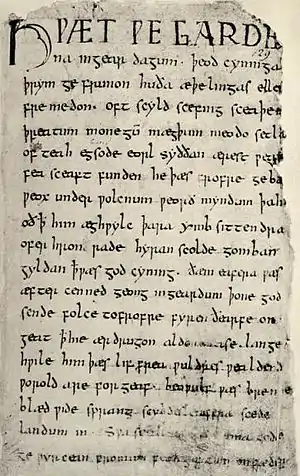
Ƿes þū hāl and ƿilcume! Hello and welcome! This a Wikibook about Old English, the Germanic language spoken in England from about 500 AD (after the arrival of the Angles, the Saxons, and Jutes from the area around northern Germany, the Netherlands, and Denmark) in southern Great Britain, until about 1100 AD, shortly after the Norman Conquest lead by William I (William the Conqueror), at which time Old English became Middle English.
While we would like this Wikibook to be a useful resource for learning Old English, it is not yet in very good condition; but it is being improved. Leorna þū ƿel! Learn well!
If you are already a speaker of Old English, or are learning it, you can see some Old English texts at Wikisource. Also, there is an Anglo-Saxon Wikipedia to which you can contribute.
History
Old English Grammar
- Fōresprǣc (Introduction) ~ The Alphabet and Pronunciation, A Short Example of Old English
- Grammar
- Orthography
- I-mutation
- Nouns
- Pronouns
- Articles
- Adjectives
- Numbers
- Verbs
- Participles
- Adverbs
- Conjunctions
- Prepositions
- Interjections
- Appositives
- Word Formation
- Punctuation
- Syntax
Additional Old English resource pages
Vocabulary
After you've mastered the grammar, the main things to do is learn vocabulary and idiomatic language usage. They both can be done by reading actual historical texts and practicing what you have already learnt, but here are some lists to help with the vocabulary.
Other electronic resources
Thankfully, there are many other quality online accessible resources already available for Old English. Here are some of them:
- An online searchable version of the Bosworth and Toller dictionary, and other Germanic language resources
- Another online searchable version of Bosworth and Toller, but this time with no other Germanic language resources